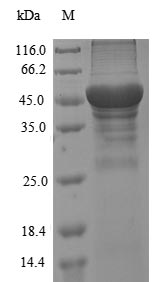Recombinant Ambrosia artemisiifolia Pectate lyase 1 is produced in E. coli and contains the full-length mature protein spanning amino acids 26 to 398. An N-terminal 6xHis-tag is attached to the protein, which helps with purification and detection. SDS-PAGE analysis confirms the product achieves greater than 90% purity, making it suitable for research work.
Pectate lyase 1 appears to play an important role in breaking down pectin, a major building block of plant cell walls. The enzyme works by cutting α-1,4-glycosidic bonds in pectate - a process that seems central to how plant tissues break apart and how disease develops. Scientists may find this protein particularly useful when studying plant-pathogen interactions, agricultural biotechnology, and how enzymes function.
Potential Applications
Note: The applications listed below are based on what we know about this protein's biological functions, published research, and experience from experts in the field. However, we haven't fully tested all of these applications ourselves yet. We'd recommend running some preliminary tests first to make sure they work for your specific research goals.
Ambrosia artemisiifolia Pectate lyase 1 is a plant enzyme that requires precise folding, proper active site formation, and specific calcium ion coordination for its functional activity in pectin degradation. The E. coli expression system cannot provide the eukaryotic folding environment or post-translational modifications that may be important for this plant enzyme's full functionality. The N-terminal 6xHis-tag is relatively small and may cause minimal steric interference. While the full-length mature protein (26-398aa) contains all functional domains, the probability of correct folding with functional pectate lyase activity requires experimental validation, particularly regarding calcium ion binding and catalytic competence.
1. Enzyme Kinetics and Biochemical Characterization Studies
This application carries a significant risk without functional validation. Pectate lyase activity requires precise tertiary structure, calcium ion coordination, and proper active site formation. If correctly folded and active (verified through enzymatic assays), the protein may be suitable for kinetic studies. If misfolded/inactive (unverified), kinetic measurements will yield biologically meaningless results.
2. Protein-Protein Interaction Studies
This application requires proper folding validation. Pectate lyase interactions with substrates or regulatory proteins require precise tertiary structure. If correctly folded (verified), the protein may identify physiological interaction partners. If misfolded/unverified, there is a high risk of non-specific binding or failure to replicate genuine protein interactions.
3. Antibody Development and Immunological Studies
This application is highly suitable as antibody development relies on antigenic sequence recognition rather than functional enzymatic activity. The full-length mature protein provides comprehensive epitope coverage for generating antibodies against pectate lyase 1.
4. Structural Biology and Protein Folding Analysis
These studies are essential for determining folding status. Techniques should include circular dichroism spectroscopy to assess secondary structure, size-exclusion chromatography to evaluate oligomeric state, and calcium-binding assays to validate functionality. However, the His-tag may interfere with crystallization for high-resolution structural studies.
Final Recommendation & Action Plan
The E. coli expression system with a small His-tag may produce folded pectate lyase, but enzymatic functionality requires experimental validation. Begin with Application 4 (Structural Characterization) to assess folding quality through CD spectroscopy, SEC, and validate enzymatic activity using pectin substrates with calcium supplementation. Applications 1 and 2 require rigorous functional validation before proceeding. Application 3 (antibody development) can proceed immediately. For reliable pectate lyase research, always include activity controls with calcium cofactor and validate key findings with plant-expressed enzyme when possible.






